Hearing Aids, Noise And Your Brain

By Denise E. Stewart, M.S., CCC-A
In a previous article I reviewed advanced digital hearing aid features that assist hearing impaired users when listening to conversation in background noise. These features require high level processing of sound and in some ways they even mimic the way the brain works when receiving sound from all directions. This prompts some hearing aid users to question the technology. Is the processing that hearing aids perform actually preempting your brain’s ability to handle background noise effectively? To answer this question we need to discuss how the brain receives information from the ears in quiet and in noise.
Hearing in Quiet:
Many people with known hearing loss report that they have very little trouble understanding conversation in a quiet room. However, they usually admit that they totally lose the conversation when the environment is noisy. Hearing research has corroborated this observation. We know that the inner ear consists of thousands of sensory hair cells that are arranged and grouped according to frequency. These hair cells are finely tuned to respond to and transmit sound in a frequency following manner. These hair cells once activated transmit their finely tuned information to their corresponding neurons. The neurons in turn transmit the temporal coding to the auditory cortex in the brain. There have been no studies to date that have shown any physiologic difference between neuronal coding activity of normal hearing and hearing impaired subjects in quiet. This means that someone with a mild hearing loss who has missing or defective hair cells in select areas of the inner ear would be able to follow a conversation in quiet due to having access to sufficient temporal coding information. They may not hear every word but they would get the gist of the conversation. For example, someone hearing a familiar melody with one or two missing notes should still be able to recognize the melody provided that the notes heard are true. Unfortunately this is not the case when background noise is present.
Hearing in Noise:
A recent study from Purdue University found that the ears of hearing impaired subjects function quite differently when background noise is present. The study concentrated on “neural synchrony” that is necessary for auditory neurons to send accurate temporal coding information of incoming sound to the brain. The finding was that there was a reduction in neural synchrony and temporal coding when noise was present for their hearing impaired subjects. When the timing is off, the information sent by the neurons to the brain is inaccurate. For example, imagine trying to decipher a melody when listening to members of an orchestra each playing the tune at a different rate. You could not do it. In fact this would be an example of a cacophony.
Now imagine that you decide to get help for your hearing loss to hear those “missing notes” in quiet. You decide that you do not need all those special hearing aid features and you are fit with an economy digital hearing aid with no special features to enhance speech in noise. When you go to a crowded restaurant with friends, all you hear is a cacophony and you blame those lousy hearing aids!
Help From Hearing Aids at Riddle Audiology:
The study cited provided actual physiologic evidence of what audiologists have seen and heard from their hearing impaired patients for years. This study also provides evidence for performing hearing tests in noise as well as quiet. While it is true that not every hearing impaired person has difficulty hearing well in noise, many do. Unless you receive testing in noise prior to amplification, you will not know if you have accurate temporal processing in noise or not. At Riddle Audiology Department and Hearing Aid Center the audiologists provide patients with comprehensive audiometric testing that includes tests of speech in noise. For those hearing impaired persons who really need them, the advanced digital hearing aid features do not preempt the brain’s ability to adapt to noise, they actually enhance the brain’s ability to decipher conversation in noise by giving it a clearer signal!
For more information or to schedule an evaluation or treatment, contact the Audiology Department at Riddle Hospital.
Barbara J. Madden, Au.D.
Doctor of Audiology/Director
Catherine M. Marino, Au.D.
Doctor of Audiology
Denise E. Stewart, M.S.
Clinical Audiologist
Lisa C. Mackenzie, M.S.
Clinical Audiologist
RIDDLE HOSPITAL
Audiology &
Hearing Aid Center
1118 West Baltimore Pike
Suite 207
Media, PA 19063
(484) 227-3200-phone
(484) 227-3265-fax
www.mainlinehealth.org/RiddleAudiology


